A recent facebook post by Jeff Kaufman raised concerns about the behavior of Intentional Insights (InIn), an EA-aligned organization headed by Gleb Tsipursky. In discussion arising from this, a number of further concerns were raised.
This post summarizes the concerns found with InIn. It also notes some concerns which were mistaken and unfounded, and facts that arose which reflect well on InIn.
This post was contributed to by Jeff Kaufman, Gregory Lewis, Oliver Habryka, Carl Shulman, and Claire Zabel. They disclose relevant conflicts of interest below.
Outline
| 1 | Exaggerated claims of affiliation or endorsement |
| 1.1 | Kerry Vaughan of CEA |
| 1.2 | Giving What We Can (GWWC) |
| 1.3 | Animal Charity Evaluators (ACE) |
| 2 | Astroturfing |
| 2.1 | The Intentional Insights blog |
| 2.2 | The Effective Altruism forum |
| 2.3 | LessWrong |
| 2.4 | |
| 2.4.1 | Soliciting upvotes and denying it |
| 2.4.2 | Not disclosing paid support |
| 2.5 | Amazon |
| 3 | Misleading figures |
| 4 | Dubious practices |
| 4.1.1 | Paid contractors' expected 'volunteering' |
| 4.1.2 | Further details regarding contractor 'volunteering' |
| 4.2 | Amazon bestseller |
| 5 | Inflated social media impact |
| 5.1 | |
| 5.2 | The Life You Can Save donations |
| 5.3 | |
| 5.4 | |
| 5.5 | Presentations of media article traffic and reach |
| 5.5.1 | TIME article |
| 5.5.2 | Huffington Post |
| 6 | Mistaken/Unfair accusations |
| 6.1 | Supposed linearity of Twitter follower increase |
| 6.2 | Objections to Intensional Insights staff 'liking' Intentional Insights content |
| 6.3 | 'Paid likes' from clickfarms |
| 7 | Positives |
| 7.1 | Jon Behar |
| 7.2 | Additional donations |
| 7.3 | Placement of articles in TIME and the Huffington Post |
| 8 | Policy responses from InIn |
| 8.1 | Post-criticism conflict-of-interest policy |
| 8.2 | Post-criticism Facebook boosting |
| 9 | Disclosures |
| 10 | Response comments from Gleb Tsipursky |
1. Exaggerated claims of affiliation or endorsement
Intentional Insights claims 'active collaborations' with a number of Effective Altruist groups in its Theory of Change document which was on its "About" page (August 21, 2016).
In a number of cases InIn makes use of the name of an effective altruist organization without asking for that organization's consent, based on minor interactions such as the organization answering questions about web traffic. From the 'Effective Altruism impact of Intentional Insights' document (August 19, 2016):
As detailed below, we observe that after learning of such claims and use of their names, some of these groups had asked InIn to stop. Yet even in some of these cases InIn had not altered the mentions in its promotional materials months later. Tsipursky also does not appear to have adopted a practice of checking with organizations before using their names in InIn promotional materials.
1.1. Kerry Vaughan of CEA
Tsipursky previously posted notes from a Skype conversation with Kerry Vaughan without his consent, and suggested he had endorsed Intentional Insights where he had not:
Tsipursky later apologized, edited the post, and said he had updated. Yet he later engaged in similar behavior (see sections 1.2 and 1.3 below).
1.2. Giving What We Can (GWWC)
Gleb has taken the Giving What We Can pledge, and contributed an article on the Giving What We Can blog on December 23, 2015. He also mentioned and linked to GWWC in his articles elsewhere.
Michelle Hutchinson, Executive Director of Giving What We Can, wrote to Tsipursky in May 2016 asking him to cease "claiming to be supported by Giving What We Can." However, the use of Giving What We Can's name as an 'active collaboration' was not removed from Intentional Insights' website, and remained in both of the above InIn documents as of October 15, 2016.
1.3. Animal Charity Evaluators (ACE)
In the InIn impact document Tsipursky quotes Leah Edgerton of ACE:
Erika Alonso of ACE subsequently made the following statement:
2. Astroturfing
Astroturfing is giving the misleading impression of unaffiliated ("grassroots") support. In GiveWell's first year its cofounders engaged in astroturfing, and this was taken very seriously by its board. Among other responses, the GiveWell board demoted one of the co-founders and fined both $5,000 each. Tsipursky expressly claimed not to engage in astroturfing:
However, astroturfing is widespread across the Intentional Insights social media presence (documented in the sections below). Tsipursky did qualify his statement with "we are not asking people to do these sorts of activities in their paid time", but lack of payment isn't enough to prevent misleading people about the nature of the support. In any case, the distinction between contractors' paid and unpaid time is blurry (see section 4.1.1).
2.1. The Intentional Insights blog
Paid contractors for Intentional Insights leave complimentary remarks on the Intentional Insights blog, and the Intentional Insights account replies with gratitude, as if the comments were by strangers. At no stage do they disclose the financial relationship that exists between them. In the screenshot below (source, Candice, John, Beatrice, Jojo, and Shyam are all Intentional Insights contractors.
The most recent examples of this happened in late August 2016, after the initial post and discussion with Tsipursky on Jeff's Facebook wall, and during the drafting of this document.
2.2. The Effective Altruism forum
Tsipursky has done the same thing on the Effective Altruism forum. Here is one instance (note that "Nyor" also goes by "Jojo"):
Here is another example (note that "Anthonyemuobo" is a professional handle used by one of Tsipursky's acknowledged contractors, "Sargin"):
2.3. LessWrong
Tsipursky posted a link to some of his wife and InIn co-founder's writing in February 2016, without noting this connection:
This is a minor lapse, one which Gleb claimed to have learned from and updated. Yet similar behavior continued:
In March 2016, Intentional Insights' contractors created accounts and started posting non-specific praise on Tsipursky's LessWrong posts:
These are all people Tsipursky pays, but none of them acknowledged it in their comments or their posts in the welcome thread. Additionally, Tsipursky did not acknowledge this relationship when he thanked them for their remarks.
LessWrong user gjm pointed out that this was misleading, and Tsipursky acknowledged this was a problem and commented on Sargin's welcome post:
While Tsipursky knew both Beatrice Sargin and Alex Wenceslao had posted similar comments, since he had replied to them, he waited for these to be discovered and pointed out before acting:
This happened a third time, with JohnC2015:
2.4. Facebook
2.4.1. Soliciting upvotes and denying it
Tsipursky claimed "when I make a post on the EA Forum and LW I will let people who are involved with InIn know about it, for their consideration, and explicitly don't ask them to upvote":
In the comment Tsipursky denies soliciting upvotes, and demands that accusations that he did be substantiated or withdrawn. Six hours later someone responded with a screenshot of a post Tsipursky had made to the Intentional Insights Insiders group showing Tsipursky soliciting upvotes:
Tsipursky's response, a couple hours later in the same thread:
Tsipursky either genuinely believed posts like the above do not ask for upvotes, or he believed statements that are misleading on common-sense interpretation are acceptable providing they are arguably 'true' on some tendentious reading. Neither is reassuring. [He subsequently conceded this was 'less than fully forthcoming'.]
2.4.2. Not disclosing paid support
Intentional Insights proposed producing EA T-Shirts, and received multiple criticisms. Tsipursky claimed he had run the design by multiple people. Again, Tsipursky did not disclose that at least five of them were people he pays:
2.5. Amazon
Tsipursky's contractor posted a 5-star review for his self-help book on Amazon without disclosing the affiliation:
Tsipursky emailed copies of his self-help book to Intentional Insights volunteers, including contractors, who responded by posting 5-star reviews on Amazon:
He later followed up with:
This is true but incomplete: the 8th review is by Asraful Islam, a volunteer affiliated to Intentional Insights.
Another Intentional Insights affiliate, unpaid at that time but now a paid virtual assistant, Elle Acquino, posted another 5-star review, not in the top 10. In that review, however, the connection to Tsipursky and his nonprofit institute was disclosed.
3. Misleading figures
In December 2015 and January 2016, Tsipursky repeatedly claimed that his articles were shared thousands of times as evidence of the effectiveness of his approach. In fact, he had been reporting Facebook 'likes' and all views on Stumbleupon as shares, greatly exaggerating the extent of social media engagement.
The initial point reflected a common issue with the interpretation of social media activity counters on websites. After this was explained to him Tsipursky claimed to have updated on the correction. However, a June 2016 document on Intentional Insight's Effective Altruism Impact again reported views as shares, exaggerating sharing by many times.
4. Dubious practices
4.1.1. Paid contractors' expected 'volunteering'
Tsipursky only takes on contractors who spend at least two hours "volunteering" for Intentional Insights for each paid hour:
In a follow-up discussion, Tsipursky suggested that contractors could temporarily reduce their volunteer hours in special circumstances, but he would not affirm that contractors would be allowed to simply say no to "volunteering":
Depending on the nature of the volunteer work, this requirement seems potentially unethical, effectively requiring that contractors do three times as much work for a fixed amount of money. We also suggest this relationship undermines the distinction Tsipursky offers between 'paid' and 'volunteer time' and the defence that the promotion his contractors undertake on his behalf is innocuous as it occurs in their 'volunteer time'.
4.1.2. Further details regarding contractor 'volunteering'
Subsequent to the preparation of the above section Tsipursky provided additional information about how he came into contact with contractors, their donations, prior unpaid volunteering, wages, and other information as evidence of genuine support. They provide that, but also support concerns regarding linkage of paid and unpaid work and financial interests.
Tsipursky states the following regarding initial meetings and hiring:
Tsipursky stated the following regarding the length of unpaid volunteering prior to the first paid work:
He also notes donations by contractors, implemented by reducing their paid hours or paid hour wage rate, as evidence of genuine support:
I have pointed out many times that there is plenty of evidence showing that those folks who do contracting are passionate enthusiasts for InIn. Let's take the example of John Chavez, who the document brought up. He chose to respond to a fundraising email to our supporter listserve in June 2016 – long before Jeff Kaufman's original post – by donating $50 per month to InIn out of his $300 monthly salary:This is bigger than a typical GWWC member, at over 15% of his annual income. Let me repeat – he voluntarily, out of his own volition in response to a fundraising that went out to all of our supporters, chose to make this donation. Just to be clear, we send out fundraising letters regularly, so it’s not like this was some special occasion. It was just that – as he said in the letter – it happened to fall on the 1-year anniversary of him joining InIn and he felt inspired and moved by the mission and work of the organization to give.
Before you go saying John is unique, here is another screenshot of a donation from another contractor who in October 2015, in response to a fundraising email, made a $10/month donation:
Again, voluntarily, out of her own volition, she chose to make this donation.
Tsipursky also indicates that paid and unpaid hours by contractors constitute only a minority of work hours at InIn, with most hours contributed by volunteers without financial compensation:
Regarding wages and requirement/expectations of unpaid volunteering, Tsipursky wrote the following:
The Upwork (formerly known as Odesk) freelancer marketplace on which contractors are hired has a minimum wage of $3.00 per hour. Combined with the expected unpaid volunteering the typical wage would be $1.00, 1/3rd of the minimum for the platform.
John is given as an example of a higher paid contractor at $7.5 per hour. However, this is combined with 3 hours of unpaid volunteering for each paid hour, rather than 2, for a combined wage of $1.875 per hour, prior to his donation of 1/3 of that wage.
In effect, the expectation of volunteering systematically circumvents the Upwork minimum wage for contractors. However, it should be noted that the Upwork minimum wage is a corporate policy, and not a national or local labor law. Contractors in low-income countries may be earning substantially more than the local minimum wages or average incomes. For example, according to Wikipedia the hourly minimum wage in US dollars at nominal exchange rates is $0.54 in Nigeria. In the Philippines minimum wages vary by location and sector, but Wikipedia lists a range of ~$0.6-$1.2 per hour for non-agricultural workers, with the latter group in the capital of Manila. So the wage per combined (paid+volunteer) hour of work would not appear to be in conflict with legal minimum wages in contractors' jurisdictions. Furthermore in a number of these jurisdictions the minimum wage is closer to the median wage, and unemployment is high.
Regarding the link between paid and unpaid hours, Tsipursky describes it as an informal understanding:
In aggregate the additional statements provide evidence of pre-existing support for InIn from new contractors. However, they also confirm a linkage of paid and unpaid labor, and contractor financial interests in promotional activity occurring during 'volunteer' hours.
4.2. "Best-selling author"
Tsipursky includes being a 'best-selling author' in his standard bio. For example, on his Patreon:
And:
And on his Amazon author page:
Normally, a reader would take "best-selling author" to mean hitting a major best-seller list like the New York Times, which indicates that very many people have decided to buy the book, and is a hard signal to fake. In Tsipursky's case, "best-selling author" means that his book was very briefly the top seller in a sub-sub-category of Amazon. Further, he reports offering his book for free and encouraging friends and contractors to download and review it. In its first two weeks the book sold 50 copies at $3 each. Cumulatively it has sold 500 copies at $3 each, and been downloaded 3500+ times free. In contrast, NYT bestseller status requires thousands of sales over the first week. Amazon bestseller status is calculated hourly by category: in small categories three purchases in an hour can win the #1 bestselling author label.
Many of those giving the book 5 star reviews are social contacts of Tsipursky, some of them paid or volunteer Intentional Insights staff, but do not disclose this association (see section 2.5).
As of August 22, 2016 the book is ranked as follows:
In light of this, calling oneself a 'bestselling author' on this sort of performance is potentially misleading.
We note that the practice of claiming bestselling author status using bestseller lists that involve very small actual sales may be widespread. This does not, however, prevent it from being misleading or controversial. For example, when Brent Underwood attained Amazon best-seller status using a few dollars in less than an hour with a book that was simply a picture of his foot, media coverage generally suggested that this highlighted a problematic practice.
5. Inflated social media impact
5.1. Facebook
Tsipursky has cited social media engagement as evidence of impact. However, in many cases it appears that this engagement is illusory. In the case of Facebook, it appears to have resulted from paid Facebook post boosting, which led to hundreds of likes on posts from clickfarms, in a process described by Veritasium: clickfarm accounts like enormous numbers of things they have not been directly paid to like in order to manipulate Facebook’s algorithms. Facebook boosting systematically attracts these clickfarm accounts, a risk which is exacerbated by boosting to regions where clickfarms are located (although clickfarms also have fake accounts purporting to be from all around the world).
In the case of InIn posts, InIn paid for that boosting. In February 2016, Tsipursky argued that this was resulting in genuine engagement and reach:
For a number of InIn blog posts with large numbers of likes (for example 318 for this recent one) these likes appear to be primarily the result of clickfarms. Accounts liking this post like vast numbers of disparate things. Here are some random selections from the middle of the list of that post:
- Himanshu's likes
- Anik's likes
- Debdeep's likes
- Sardar's likes
- Jidan's likes
- Kanhaiya's likes
- Julak's likes
- Farhana's likes
- Kawser's likes
- Selly's likes
There is further circumstantial evidence: the likes are often from accounts in low-income countries with substantial clickfarm operations. Tsipursky defended this as coincidental overlap caused by Intentional Insight's targeting of low-income countries, however countries with similar demographics without large click farm operations are not well represented.
In arguing for the impact of his writing, Tsipursky cited a post on the TLYCS blog that got 500 likes in its first day on the TLYCS blog while typical posts got 100-200 likes:
However, this appears to also be a case of Facebook ad boosting eliciting engagement from clickfarms, this time by a former TLYCS employee (subsequently asked to stop by TLYCS) rather than InIn, according to this statement from TLYCS' Jon Behar:
The profiles contributing the likes and whose profiles show no other engagement with TLYCS, or with EA ideas:
After Jeff Kaufman raised concerns about the pattern of Facebook likes in February 2016, Tsipursky doesn't seem to have looked into the issue further prior to the August 2016 discussion, when outside observers provided indisputable evidence and explained the role of boosting in generating clickfarm likes. While the boosting-clickfarm link is counterintuitive, the lack of any other engagement by the clickfarmers was apparent both before and after the raising of concerns in February. Failure to examine the ineffectiveness of these social media channels, even after concerns were raised, raises questions about InIn's practices as an outreach and content marketing organization.
5.2. The Life You Can Save donations
In his "Effective Altruism impact of Intentional Insights" document (archived copy), Tsipursky claims that content he has published with The Life You Can Save is able to "regularly reach an audience of over 5,000, at least 12% of whom make a donation" suggesting over 600 donations per article, based on a reference letter from a former TLYCS employee. However, these figures were incorrect, and TLYCS estimates that the total number of visitors who landed on Tsipursky's blog posts at the TLYCS blog was ~3,000 (rather than tens of thousands), with donations directly from those page totalling likely 2-3 (rather than hundreds).
While the reference letter Tsipurksy cites could easily give that false impression, it is implausible in light of other information available to him about the impact of his pieces. For example, Tsipursky also cites an article in a major news outlet as producing two donations to GiveDirectly totalling $500:
Since two donations is far less than ~600, this "12% of 5,000 views" number was clearly not sanity checked before being used to argue the case for Intentional Insights to EAs and in a fundraising document aimed at EAs. It's possible that Tsipursky simply took a surprisingly good estimate from a partner organization at face value, but one might expect an expert in marketing to investigate why this channel was performing so much better than his other channels.
5.3. Twitter
Tsipursky implied that his 10k Twitter followers represent organic interest:
The InIn account is following approximately as many accounts as follow it, 11.7k to 11.4k. Oliver observed that many of these accounts have "100% follow-back" in their descriptions. It seems like they're offering an exchange: InIn adds these accounts as followers, and they add his back in return, or vice versa. This is not an indication of actual interest from fans, and these accounts have almost no organic engagement with InIn such as retweets:
5.4. Pinterest
InIn follows over 20,000 people on Pinterest, far more people than follow it. As on the InIn Facebook page and Twitter, follower engagement is extremely low, and dominated by persons affiliated with InIn, suggesting the vast majority of followers are not genuine.
Examining the profiles of followers, there appears to be a very high rate of clickfarm/advertising accounts. Here are 10 randomly selected InIn Pinterest follower accounts. 10 out of 10 appear to be spam/advertising/clickfarm accounts:
- borisparr
- gabrielledowdq
- oradarcusiwz
- beautytips70413
- evareese302
- jacobwelch336
- brandon_clarkso
- healthabundantl
- emmahughes1984
- cassondrapinkha
5.5. Presentations of media article traffic and reach
5.5.1. TIME article
In the InIn EA impact document we see this:
The document does not make clear that the article did not appear in the print magazine, so print readers would not be exposed to it there. Online, we are left to anchor on a figure of 65 million views, without any reference to the actual views of the article (which were tremendously lower).
Somewhat later in the document we see this:
As another example, here are numbers in a spreadsheet we set up recently to track clicks to EA nonprofit websites from the Time piece we published.
However, while the article made the case for GiveWell recommended charities and EA charity evaluators, only 132 clicks reached those organizations through the article, 70 of which did not immediately bounce, according to InIn's traffic figures. Specifically, in the original InIn spreadsheet the 'signed up to newsletter or converted in other ways'' column had a value of 13 for ACE, and 1 'clicked on donate button'
The corrected spreadsheet shows a value of 2 rather than 13 for 'signed up to newsletter.'
 Thus InIn knew that the product of traffic and click-through was very low, suggesting some combination of low traffic for a piece on Time's website and low click-through rates. However this negative information was removed from the main text of the document while the 65 million figure (for all articles on the TIME website, including dubious traffic) was made prominent.
Thus InIn knew that the product of traffic and click-through was very low, suggesting some combination of low traffic for a piece on Time's website and low click-through rates. However this negative information was removed from the main text of the document while the 65 million figure (for all articles on the TIME website, including dubious traffic) was made prominent.
5.5.2. Huffington Post
The InIn EA impact document also included this discussion of a Huffington Post article:
However, he provided no evidence of reaching new audiences via the placement in the HuffIngton Post. Instead, he provided an example of an already supportive facebook friend, who apparently encountered the article from Tsipursky's Facebook page, not the Huffington Post.
6. Mistaken/Unfair accusations
6.1. Supposed linearity of Twitter follower increase
It was suggested that Tsipursky's twitter page shows surprisingly linear increases in followers over time (e.g. +8 followers a day for 10 days in a row, which may be indicative of click-farming. This piece of evidence is likely mistaken, as the tool used (sharecounter) probably linearly interpolates days where they do not record a user's Twitter followers, and thus the apparent linearity is an artifact.
6.2. Objections to Intensional Insights staff 'liking' Intentional Insights content
In the course of the original discussion of Jeff's post on Facebook, numerous people took exception to staff or volunteers 'liking' or supporting InIn content. This criticism is misguided: this is common practice both for nonprofits generally and within the EA community: many EAs affiliated to a given group 'like' or share content without disclosing their affiliation. Although issues around appropriate disclosure can be subtle, acts like this on social media do not on reflection seem significant enough to warrant disclosure of interests to the authors of this document.
6.3. 'Paid likes' from clickfarms
In the February 2016 discussion it was suggested the Tsipursky might be directly paying for likes from clickfarms. However, as discussed in section 5.1, while the likes in question appear to have resulted from paid Facebook boosting, and to be from clickfarms, they were not directly paid for. Instead, the boosting attracted clickfarm likes through an accidental process explained well the linked Veritasium video.
7. Positives
In the course of research into and discussion around InIn, some facts that reflect well on InIn were discovered. These are listed below. We don't think this comprises all evidence favourable of InIn: the impact document, Tsipursky's post on the EA forum, and the Intentional Insights website offer further evidence. (We have not looked at these closely enough to have a view on them.)
7.1. Jon Behar
One TLYCS employee who was worked with Tsipursky on Giving Games says Tsipursky has made helpful introductions:
Behar is also quoted in the InIn EA impact doc as saying:
7.2. Additional donations
TLYCS has information indicating that Tsipursky's posts combined drove about two or three donations, and the Huffington Post article resulted in to donations to GiveDirectly totaling $500. Tracking donations is hard, so this is definitely an underestimate.
7.3. Placement of articles in TIME and the Huffington Post
Tsipursky's articles in TIME and the Huffington Post got lots of exposure for EA ideas. Additionally, being able to get articles placed there is impressive.
8. Policy responses from InIn
During discussions with Tsipursky regarding drafts of this document he mentioned some InIn policy changes made in response to the criticisms. This section does not reflect any other changes InIn may have made, primarily because we haven't been able to put in the time to follow up on each practice and see whether it has continued. We also note that Tsipursky provided additional information regarding Amazon sales, contractor names, and payment practices upon request for this document.
8.1. Post-criticism conflict-of-interest policy
Following the discussion under Jeff Kaufman's post in August 2016, InIn created a conflicts of interest policy document:
8.2. Post-criticism Facebook boosting
Tsipursky now states:
Regarding InIn social media policy, we are making sure to avoid boosting any more posts to clickfarm countries. We're generally not boosting posts right now to anyone but fans of the page who live in the US and other rich countries. We found we couldn't ban identifiable clickfarm accounts from the FB page, unfortunately, so we're being really cautious about boosting posts.
9. Disclosures
Many people contributed to this document, some of them anonymously. Below are disclosures from people who contributed substantially and want to be clear about any potential conflicts of interest. None of the individuals below contributed on behalf of an employer or organization, and their contributions should not be taken to imply any stance on the part of any organization with which they are affiliated.
-
Jeff Kaufman has donated to the Centre for Effective Altruism (CEA), 80,000 Hours, and Giving What We Can. He has volunteered for Animal Charity Evaluators in a very minor capacity. His wife, Julia Wise, works for CEA and serves on the board of GiveWell.
-
Gregory Lewis has previously worked as a volunteer for Giving What We Can and 80,000 hours. He has donated to Giving What We Can and the Global Priorities Project.
-
Oliver Habryka currently works for CEA, and has been active in EA community organizing in a variety of roles.
-
Carl Shulman currently works for the Future of Humanity Institute, and consults for the Open Philanthropy Project. He previously worked for the Machine Intelligence Research Institute (MIRI). He has previously done some consulting and volunteering for the Center for Effective Altruism, especially 80,000 Hours. His wife is executive director of the Center for Applied Rationality and a board member of MIRI.
-
Claire Zabel works at the Open Philanthropy Project, and serves on the board of Animal Charity Evaluators. She has donated to a variety of EA organizations and has close ties with other people in the EA community.
10. Response comments from Gleb Tsipursky
Tsipursky has responded in the comments below: part one, part two, part three.

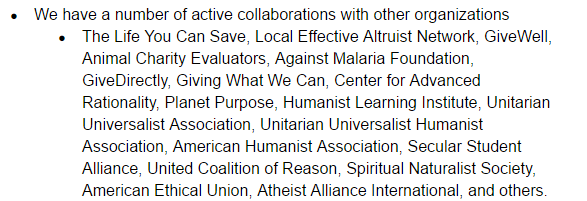

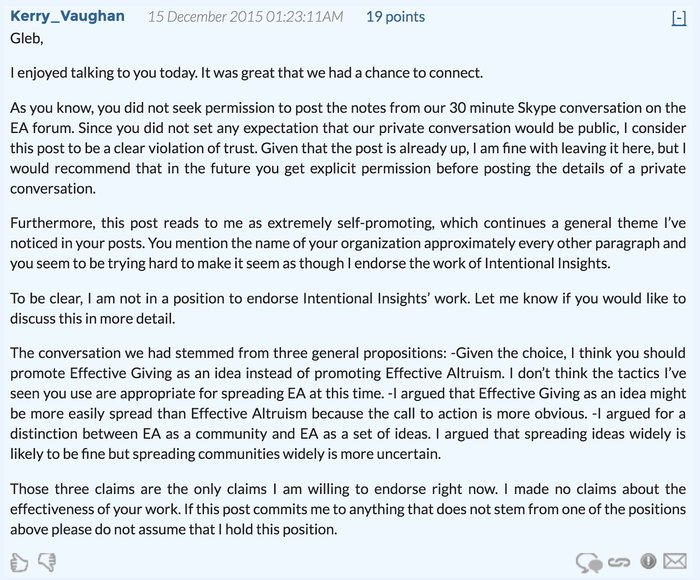
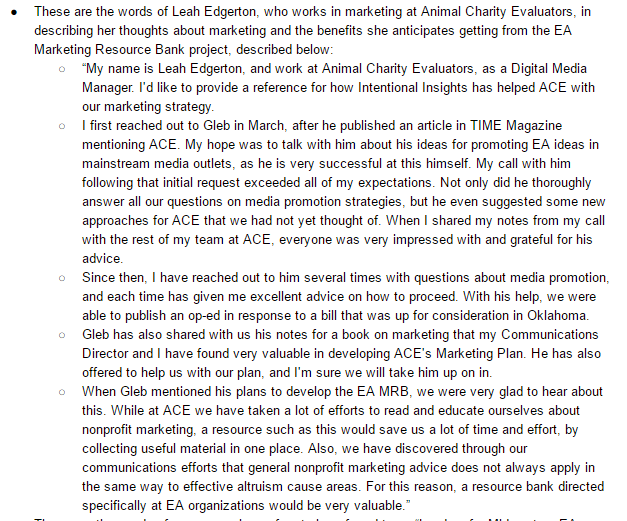
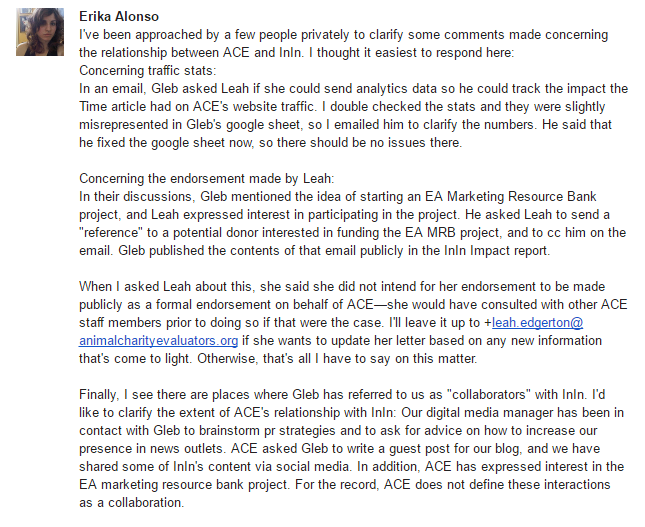
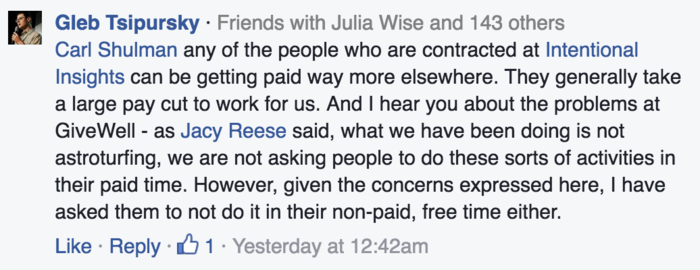
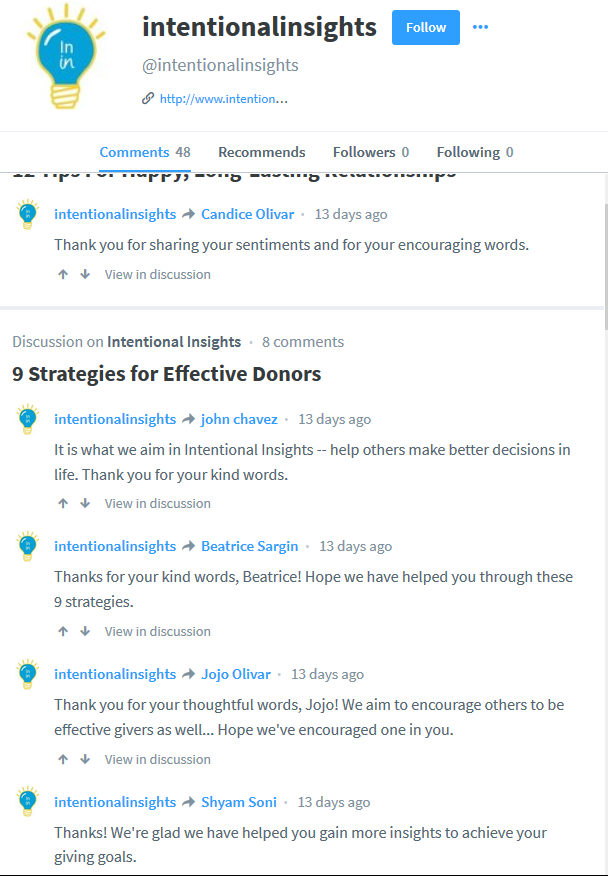
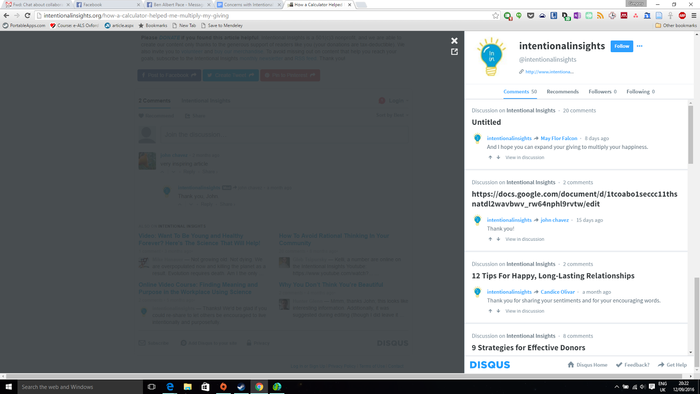

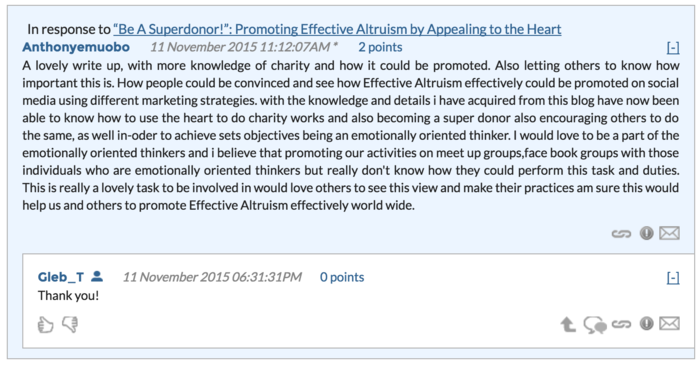

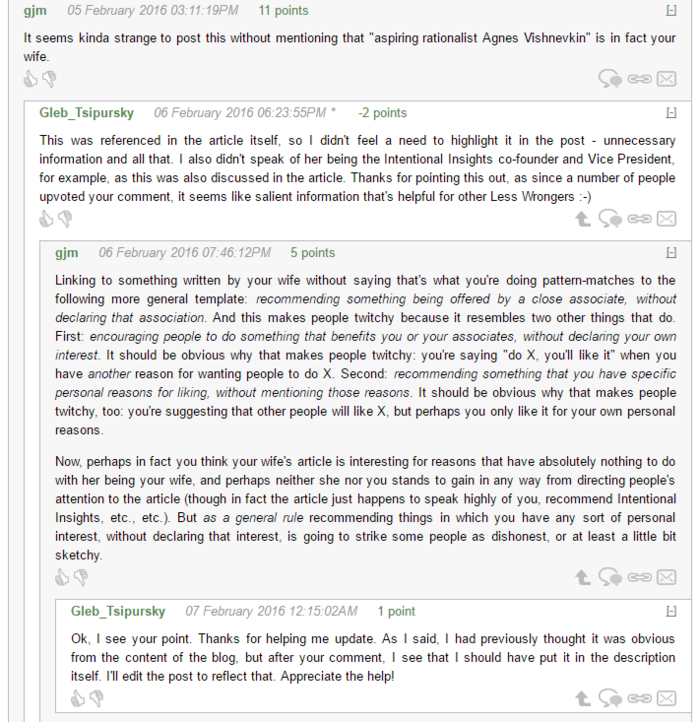
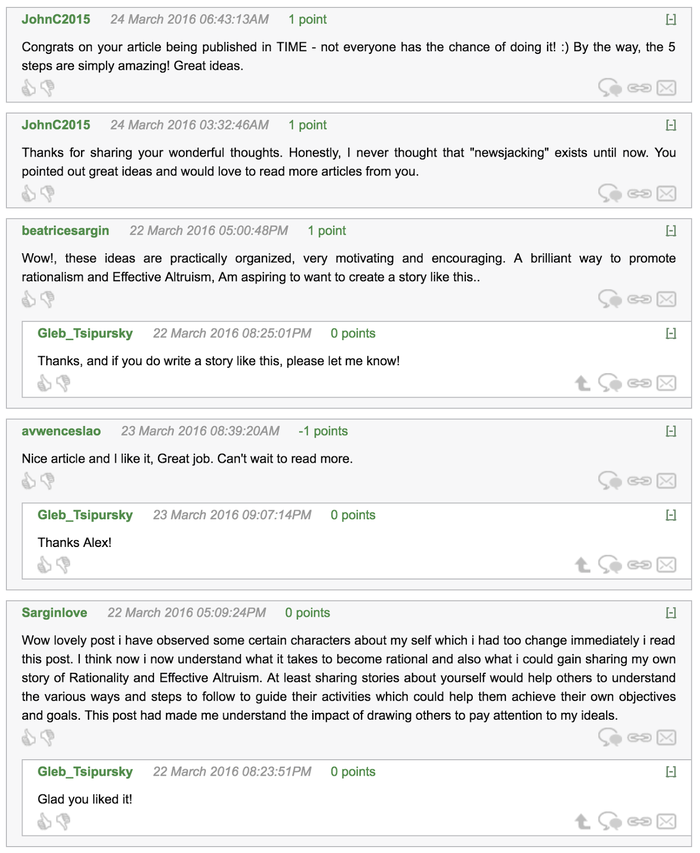
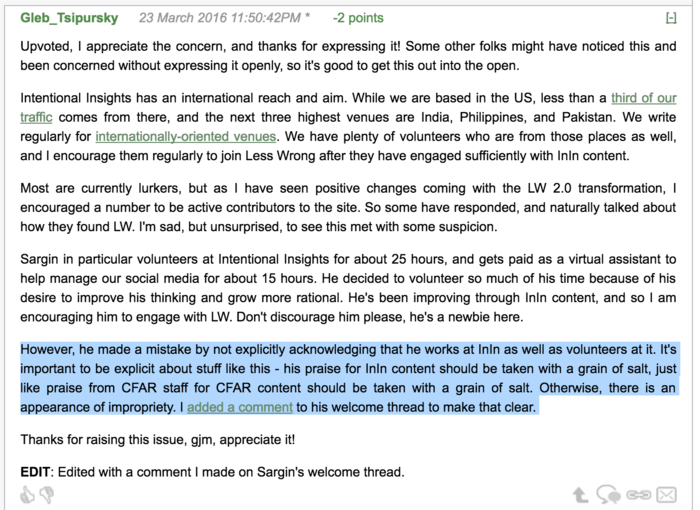
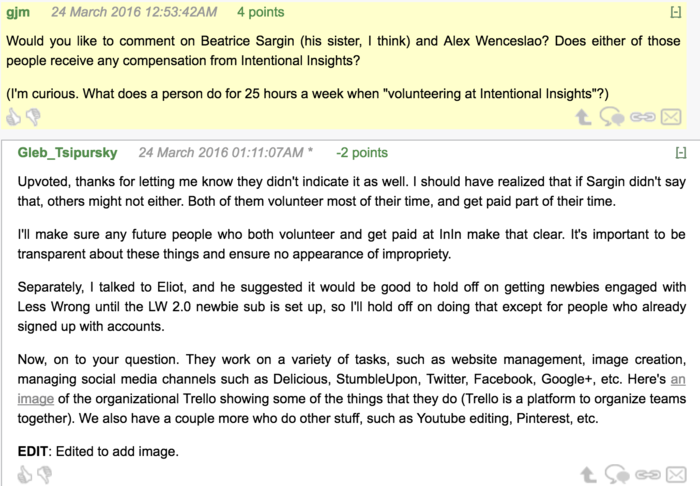
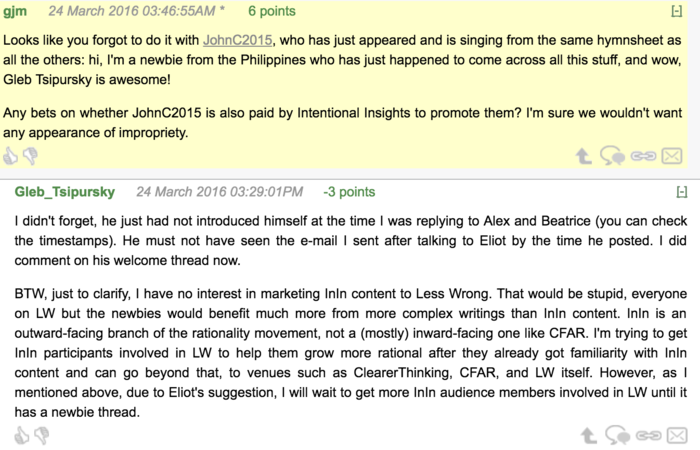
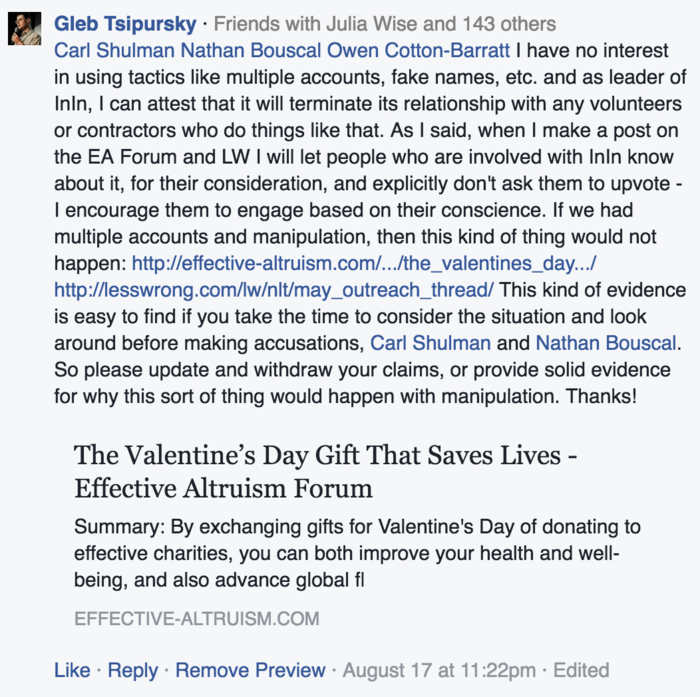
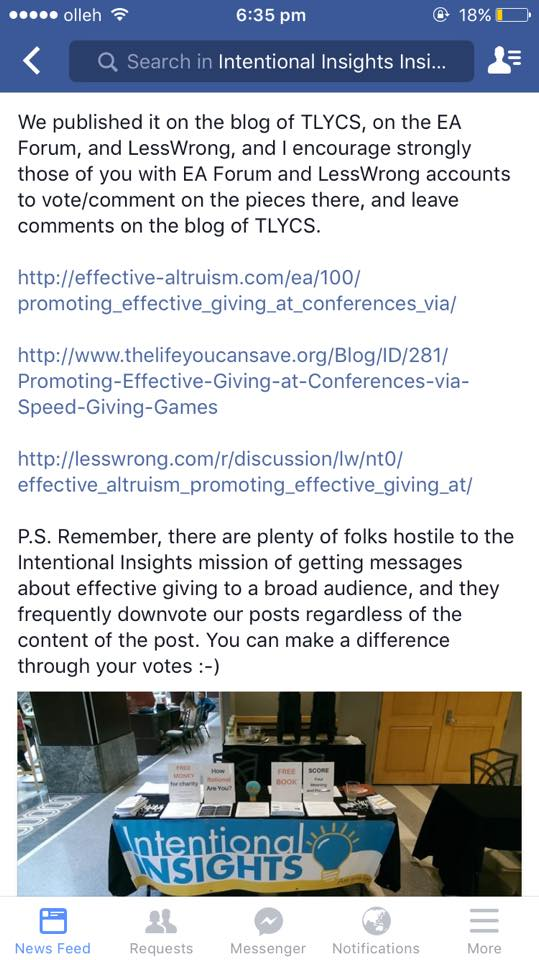

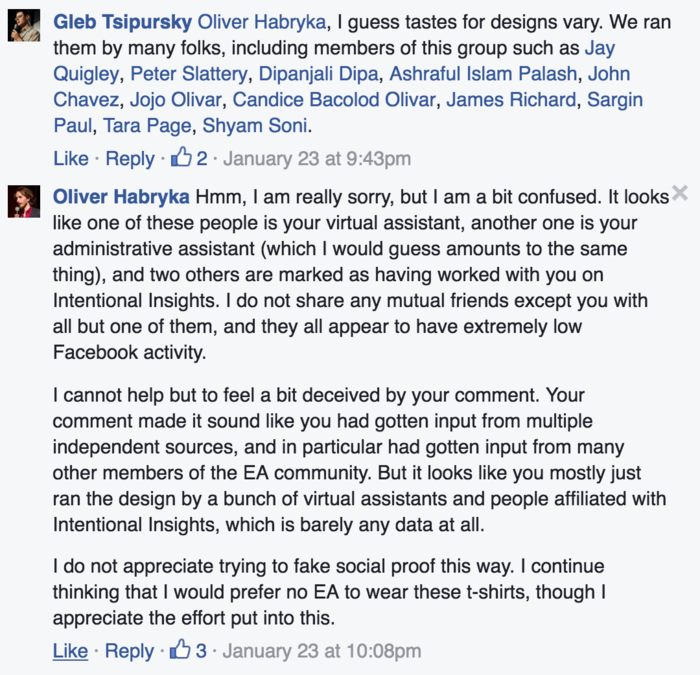
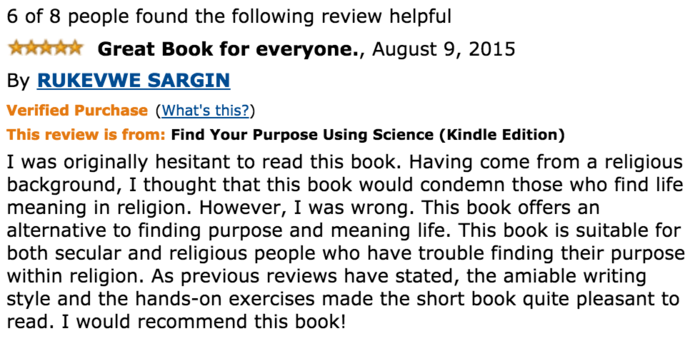



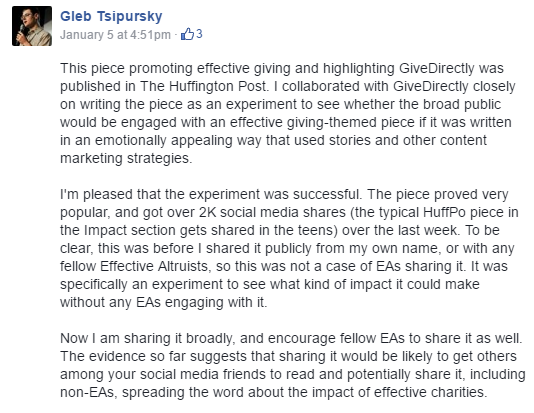
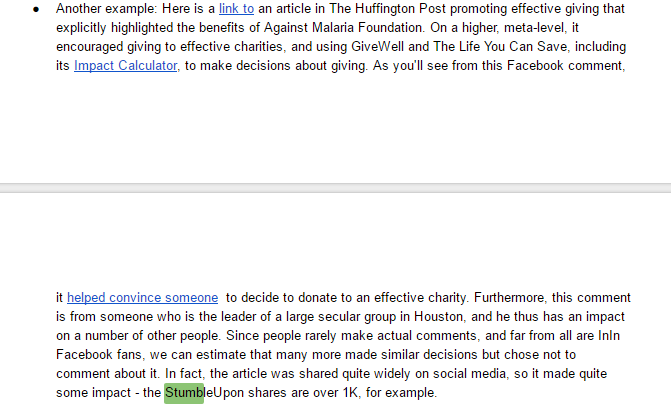

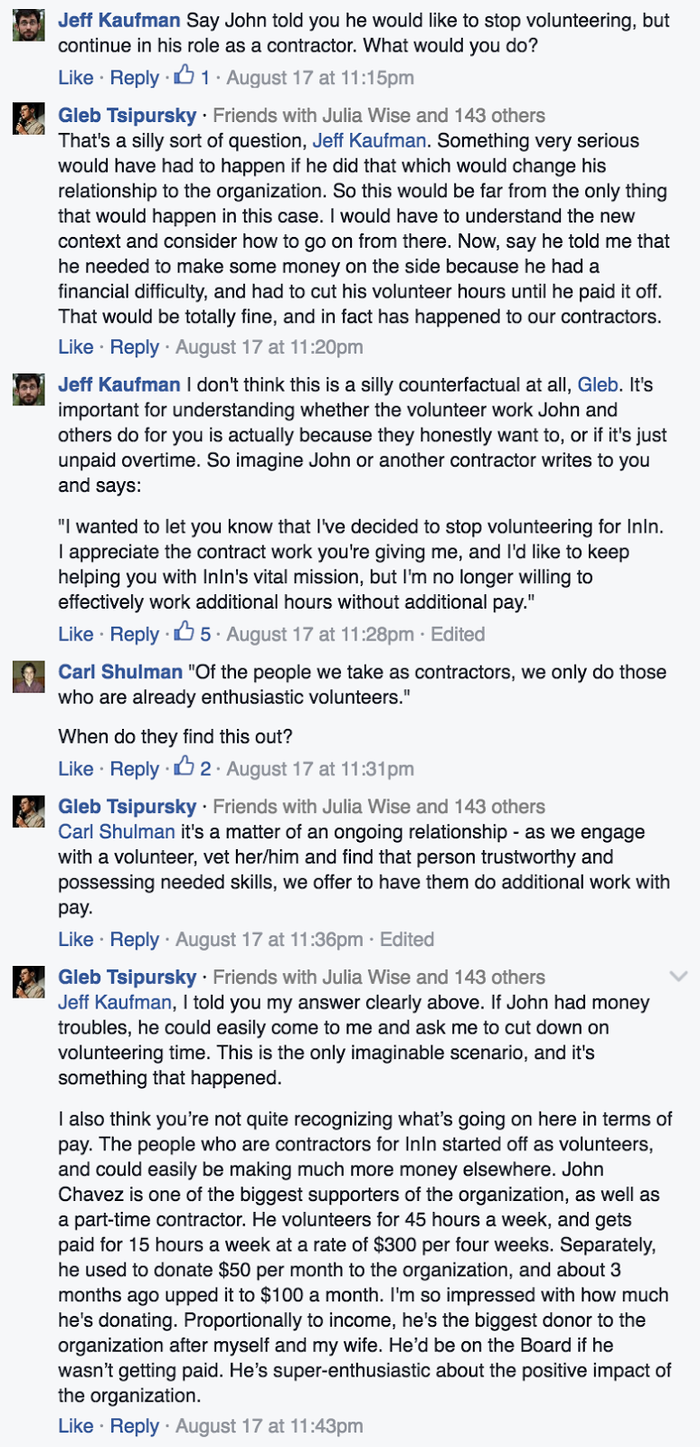
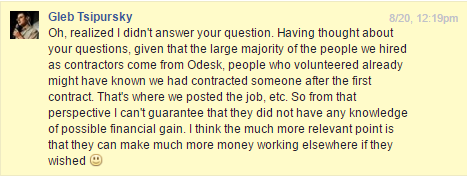
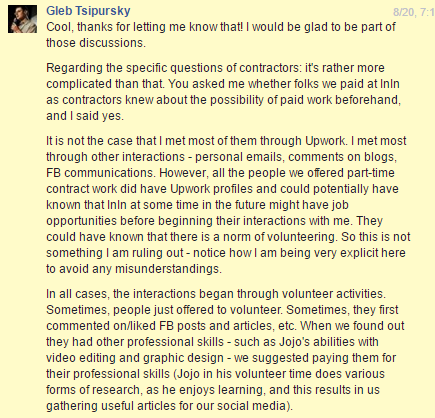

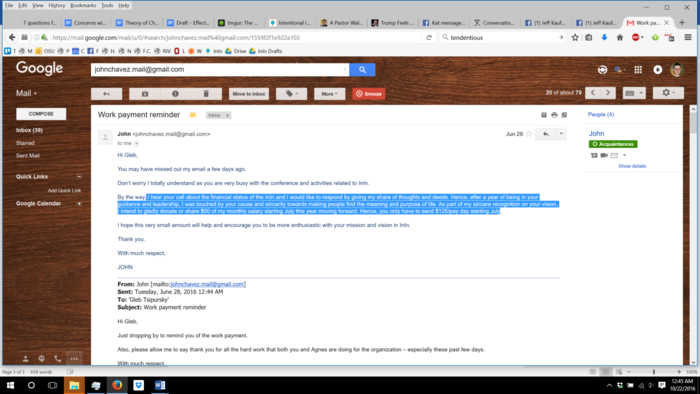
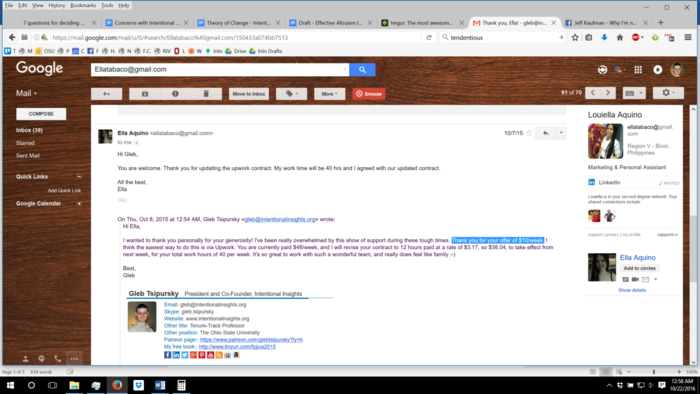
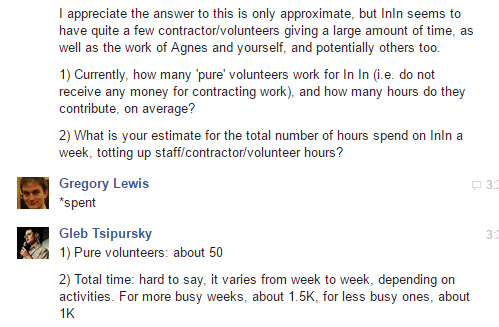
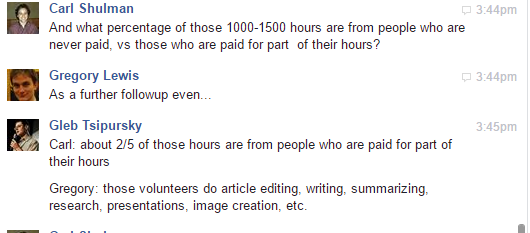

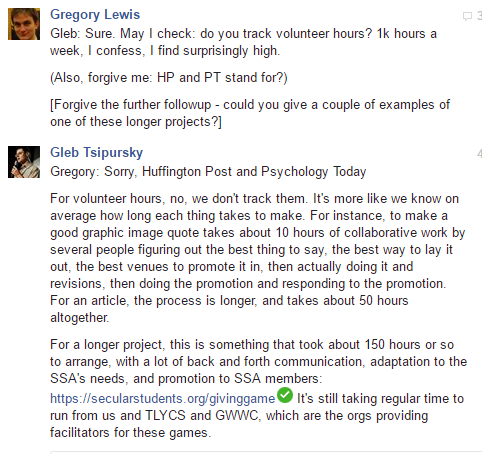
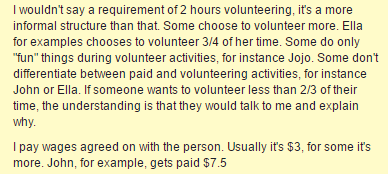
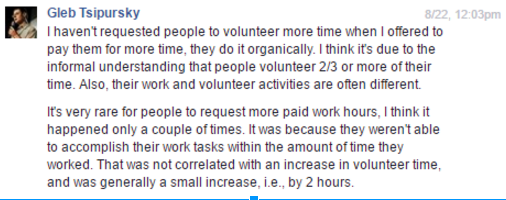
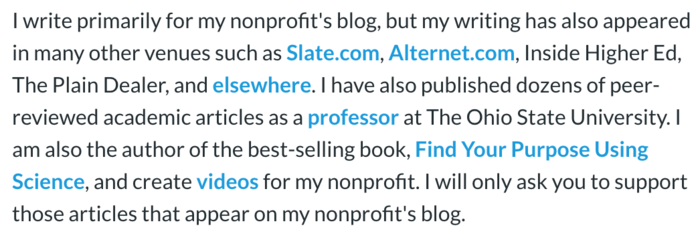
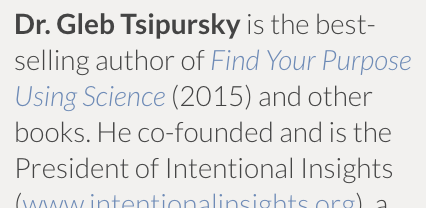
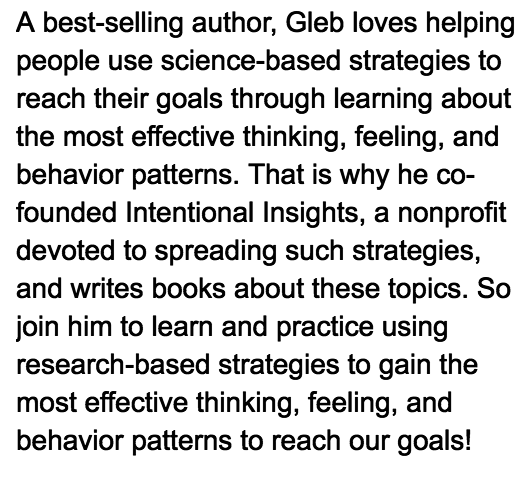
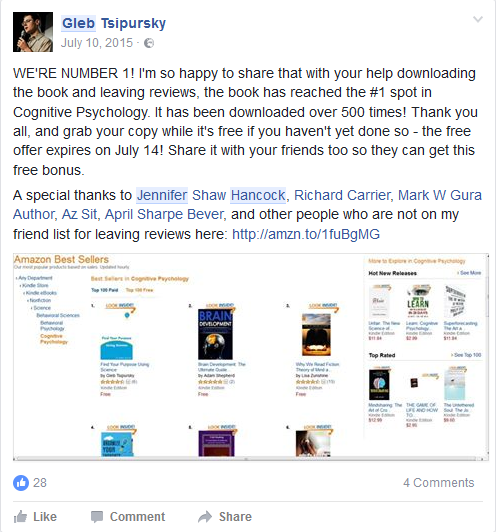

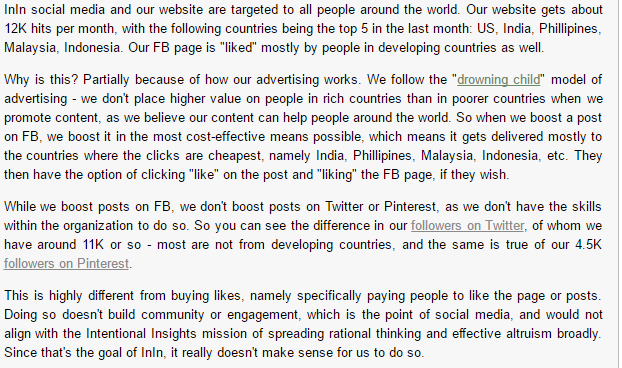

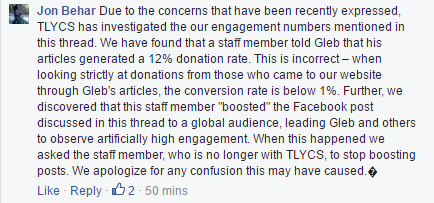


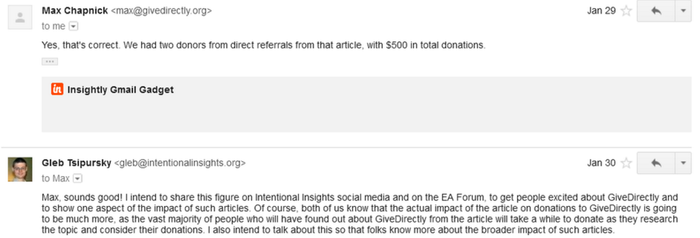
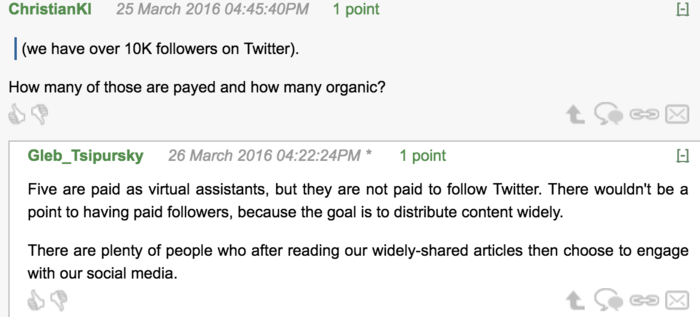
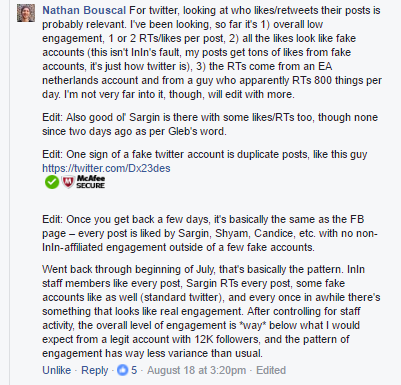
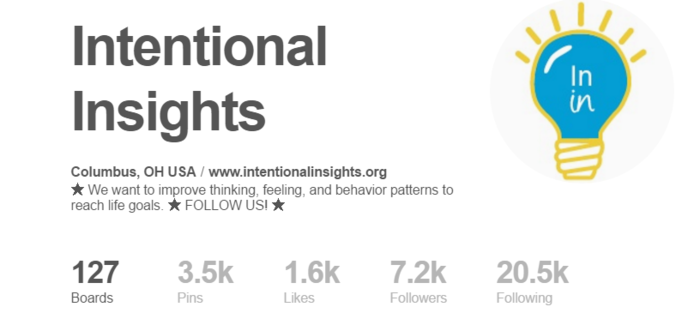



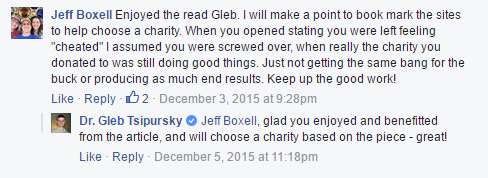

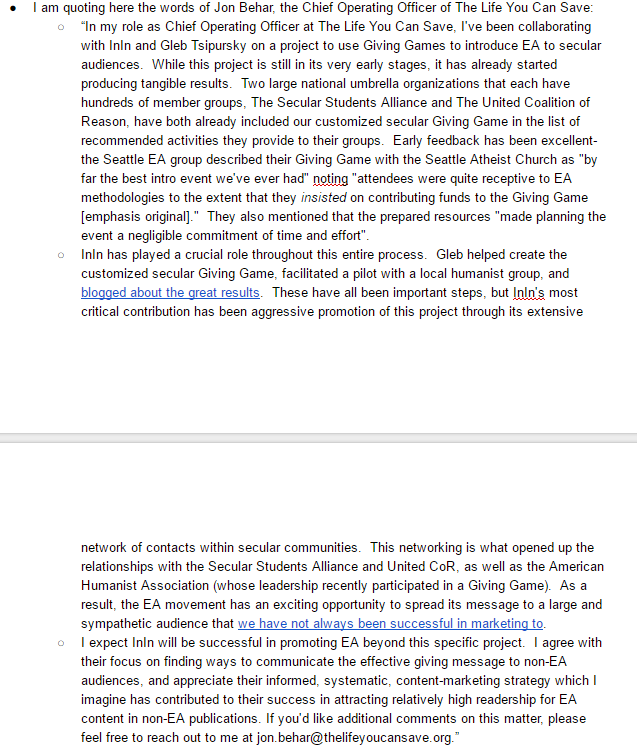
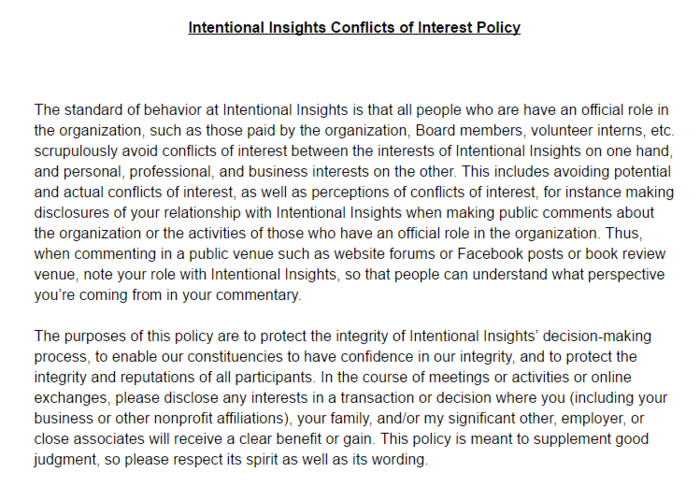
My fellow contributors and I aimed in this document to have as little of an 'editorial line' as possible: we were not all in complete agreement on what this should be, so thought it better to discuss the appropriate interpretation of the data we provide in the comments. I offer mine below: in addition to the disclaimers and disclosures above, I stress I am speaking for myself, and not on behalf of any other contributor.
I believe InIn and Tsipursky are toxic to the EA community. I strongly recommend that EAs do not spend time or money on InIn going forward, nor any future projects Tsipursky may initiate. Insofar as there may be ways for EA organisations to insulate themselves from InIn, I urge them to avail themselves of these opportunities.
A key factor in this extremely adverse judgement is my extremely adverse view of InIn's product. InIn's material is woeful: a mess of misguided messaging (superdonor, the t-shirts, 'effective giving' versus 'effective altruism', etc. etc.), crowbarred in aspirational pop-psychology 'insights', tacky design and graphics, and oleaginous self-promotion seeping through wherever it can (see, for example, the free sample of Gleb's erstwhile 'amazon bes... (read more)
One thing to consider is that too much charity for Gleb is actively harmful for people with ASDs in the community.
If I am at a party of a trusted friend and know they've only invited people the trust, and someone hurts my feelings, I'm likely to ascribe it to a misunderstanding and talk it out with them. If I'm at a party where lots of people have been jerks to me before, and someone hurts my feelings, I'm likely to assume this person is a jerk too and withdraw.
By saying "I'm updating" and then committing the same problems again, Gleb is lessening the value of the words. He is teaching people it's not worth correcting others, because they won't change. This is most harmful to the people who most need the most direct feedback and the longest lead time to incorporate it.
Note: I am socially peripheral to EA-the-community and philosophically distant from EA-the-intellectual-movement; salt according to taste.
While I understand the motivation behind it, and applaud this sort of approach in general, I think this post and much of the public discussion I've seen around Gleb are charitable and systematic in excess of reasonable caution.
My first introduction to Gleb was Jeff's August post, read before there were any comments up, and it seemed very clear that he was acting in bad faith and trying to use community norms of particular communication styles, owning up to mistakes, openness to feedback, etc. to disarm those engaging honestly and enable the con to go on longer. I don't think I'm an especially untrusting person (quite the opposite, really), but even if that's the case nearly every subsequent revealed detail and interaction confirmed this. Gleb responds to criticism he can't successfully evade by addressing it in only the most literal and superficial manner, and continues on as before. It is to the point that if I were Gleb, and had somehow honestly stumbled this many times and fell into this pattern over and over, I would feel I had to withdraw on... (read more)
I take your point as "aren't we being too nice to this guy?" but I actually really like the approach taken here, which seems extremely fair-minded and diligent. My suspicion is this sort of stuff is long-term really valuable because it establishes good norms for something that will likely recur in future. I'd be much more inclined to act with honesty if I believed people would do an extremely thorough public invesitigation into everything I'd said, rather than just calling me names and walking away.
I'd like to agree partially with MichaelPlant and Paul_Crowley, in so far as I'm glad that I'm part of a community that responds to problems in such a charitable and diligent manner. However, I feel they missed the most important point of shlevy's comment. Without arguing for a less fair-mined and thoughtful response, we can still ask the following: Gleb started InIn back in 2014; why did it take us two years to get to the point where we were able to call him out on his bad behaviour? This could've been called out much earlier.
I think the answer looks like this:
Firstly, Gleb has learned the in-group signals of communicating in good-faith (for example, at every criticism, he says he has "updated", and he says 'thank you' for criticism). This alone is not a problem - it would merely take a few people to realise this, call it out, and then he could be asked to leave the community.
There's a second part however, which is that once a person has learned (from experience) that Gleb is acting in bad faith, the next time that person comes to the discussion, everybody else sees the standard signals of good-faith communication, and as such the person may be hesitant to treat Gleb a... (read more)
I just want to highlight that I feel like part of this post is based on a false premise; you mention InIn was started in 2014. While that may be true, all of the incidents in EA (and Less Wrong) circles cited above date to November 2015 or later. Gleb's very first submission in the EA forum is in October 2015. By saying 'it took two years' and then talking about 'months rather than years' you give the impression that Gleb could have been excluded sometime back in 2015 and would have been elsewhere, which I think is pretty misleading (though presumably unintentionally so).
The truth is that it took a little over 9 months from Gleb's first post to Jeff's major public criticism. 9 months and a decent amount of time is not trivial. But let's not overstate the problem.
"There's a second part however, which is that once a person has learned (from experience) that Gleb is acting in bad faith, the next time that person comes to the discussion, everybody else sees the standard signals of good-faith communication, and as such the person may be hesitant to treat Gleb as they would treat someone else who was clearly acting in bad faith. This is because they would be seen as unnecessarily harsh by people without the background experiences - as was seen multiple times in the original Facebook thread, when people (who did not have the past experience with Gleb) were confused by the harshness of the criticism, and criticised the tone of the conversation."
I do strongly agree with this. I had some very frustrating conversations around that thread.
Seems worth establishing the fact that bad actors exist, will try to join our community, and engage in this pattern of almost plausibly deniable shamelessly bad behavior. I think EAs often have a mental block around admitting that in most of the world, lying is a cheap and effective strategy for personal gain; I think we make wrong judgments because we're missing this key fact about how the world works. I think we should generalize from this incident, and having a clear record is helpful for doing so.
Scientific departments have ethics boards. Good online communities (e.g. Hacker News) have moderators. Society as a whole has a justice part of governance, and other groups that check on the decisions made by the courts. Suggesting that it feels cult-y to outsource some of our community norm-enfacement (so as to save the community as a whole significant time input, and make the process more efficient and effective) is... I'm just confused every time someone calls something totally normal 'cult-y'.
I think being too nice is a failure mode worth worrying about, and your points are well taken. On the other hand, it seems plausible to me that it does a more effective job of convincing the reader that Gleb is bad news precisely by demonstrating that this is the picture you get when all reasonable charity is extended.
I don't think incompetent and malicious are the only two options (I wouldn't bet on either as the primary driver of Gleb's behavior), and I don't think they're mutually exclusive or binary.
Also, the main job of the EA community is not to assess Gleb maximally accurately at all costs. Regardless of his motives, he seems less impactful and more destructive than the average EA, and he improves less per unit feedback than the average EA. Improving Gleb is low on tractability, low on neglectedness, and low on importance. Spending more of our resources on him unfairly privileges him and betrays the world and forsakes the good we can do in it.
Views my own, not my employer's.
In the original facebook thread I was highly critical of intentional insights, I have not read all the followup here yet, but I would like to note that after that thread the next "thing" I saw from Intentional Insights was this post about EA marketing. I thought that was a highly competent and interesting contribtuion to the EA community. All of the ongoing concerns about II may stand - but there is clearly a few people associated with the org who have valuable contributions to make to the future of the community,
The most embarrassing aspect of the exclusionary, witch hunt, no-due-diligence point of view which some people are advocating in the comments here is that it probably would have merited the early and permanent exclusion of the Singularity Institute/MIRI from the EA community. Holden wrote a blog on LessWrong saying that he didn't like their organization and didn't think they were worth funding. Some assorted complaints have been floating around the web for a long time complaining about them associating with neoreactionaries and about LessWrong being cultists as well as complaints about the way they communicate and write. There's been a few odd 'incidents' (if you can call them that) over the years between MIRI, LessWrong, and the rationalist sphere. It would be easy to jumble all of that together into some kind of meta-post documenting concerns, and there is certainly no shortage of people who are willing and able to write long impassioned posts expressing their feelings and saying that they want nothing to do with SIAI/MIRI and recommending others to adhere to that. We could have done that, lots of people would come out of the woodwork to add their own complaints, the conversation would reach critical mass, and boom - all of a sudden, half the steam behind AI safety goes down the tubes.
It's easy to find online communities today where people are mind-numbingly dismissive of anything AI-related due to a poorly-argued, critical-mass groupthink against everything LessWrong. Good thing that we're not one of them.
I agree that it's important that EA stay open to weird things and not exclude people solely for being low status. I see several key distinctions between early SI/early MIRI and Intentional Insights:
I don't think this comparison holds water. Briefly, I think SI/MIRI would have mostly attracted criticism for being weird in various ways. As far as I can tell, Gleb is not acting weird; he is acting normal in the sense that he's making normal moves in a game (called Promote-Your-Organization-At-All-Costs) that other people in the community don't want him playing, especially not in a way that implicates other EA orgs by association.
Whatever you think of that object-level point, an independent meta-level point: it's also possible that the EA movement excluding SI/MIRI at some point would have been a reasonable move in expectation. Any policy for deciding who to kick out necessarily runs the risk of both false positives and false negatives, and pointing out that a particular policy would have caused some false positive or false negative in the past is not a strong argument against it in isolation.
I see insight in what Qiaochu wrote here:
... (read more)[ETA: a number of these comments are addressed to possible versions of this that John is not advocating, see his comment replying to mine.]
My attitude on this is rather negative, for several reasons:
- The movement is diverse and there is no one to speak for all of it with authority, which is normal for intellectual and social movements
- Individual fora have their moderation policies, individual organizations can choose who to affiliate with or how to authorize use of their trademarks, individuals can decide who to work with or donate to
- There was no agreed-on course of action among the contributors to this document, let alone the wider EA community
- Public discussion (including criticism) allows individual actors to make their own decisions
- There are EAs collaborating with InIn on projects like secular Giving Games who report reaping significant benefits from that interaction, such as Jon Behar in the OP document; I don't think others are in a position to ask that they cut off such interactions if they find them valuable
- I think the time costs of careful discussion and communication are important ones to pay for procedural justice and trust: I would be very uncomfortable with (and n
... (read more)Here are some details on how this post came together: jefftk.com/p/details-behind-the-inin-document
Thank you - this represents a very conscientious follow-up to serious concerns and a very complicated discussion. I appreciate the presentation of considered evidence and the opportunity given for a) members of the community pool their concerns and b) InIn to give their response.
Gleb, Intentional Insights board meeting, 9/21/16 at 22:05:
"We certainly are an EA meta-charity. We promote effective giving, broadly. We will just do less activities that will try to influence the EA movement itself. This would include things like writing articles for the EA forum about how to do more effective marketing. We will still do some of that, but to a lesser extent because people are right now triggered about Intentional Insights. There's a personalization of hostility associated with Intentional Insights, so we want to decrease some of our... (read more)
See 53:10-57:30 for discussion of social media.
A questioner asks about the concerns raised about InIn's social media presence. Tsipursky gives the raw numbers for social media including Facebook, Twitter, and Pinterest. He admits to the presence of clickfarms in facebook likes (although not the massive scale), but denies problems for Twitter and Pinterest while presenting them as good news about social media impact.
He conveys this by saying that the precise mechanism in Facebook is not known to apply to the other channels, failing to mention the evidence regarding them. There is even an exchange with Agnes Vishnekvin about how great it is to have so many Pinterest followers, since there are more women on Pinterest.
This meeting took place Sept 21st, but Tsipursky had been informed about the Twitter and Pinterest problems (lack of engagement, InIn following thousands of people, etc) discussed in the doc in August. He only addressed the Facebook problem mentioned by the questioner, while sweeping problems with the other channels under the rug and strongly implying they were fine.
23:50-25:40 A questioner asks about the controversy with InIn and the EA movement. It is said a few existing and potential donors/pledges withdrew from supporting InIn after the controversy. Also Tsipursky and Vishnevkin say that 2 or 3 people at EA Global had considered 4-figure donations to InIn, and these may have fallen through in light of the subsequent revelations and discussion.
Gleb's problems seem due to important differences in social status instincts. For example, Eliezer once wrote that he doesn't experience the "status smackdown emotions" that other people experience, but he didn't realize it until a lot of people complained that his Harry Potter character comes across as insufferably arrogant to them. Readers wanted to smack down his Harry Potter character but this possibility did not occur to Eliezer at the time. So, Eliezer could not have written a Harry Potter character that people did not want to smack down.
I ... (read more)
I see a lot of examples of people investing a lot of energy giving Gleb feedback to no result. What do you think should be done differently that would lead to a different result?
I don't want to shame anyone for things they can't control, but if Gleb does not have the abilities that are necessary for outreach and fundraising, it is correct for him to not do outreach and fundraising. This is in some sense discrimination based on ability, but calling it "behaving like an ableist" seems like a really bad framing to me. First, it frames it as an issue of identity rather than individual actions. It would be more helpful to say "expecting Gleb to X unfairly discriminates on ability" than "Expecting X is behaving like an ableist"
Second, ableist is a vague word that includes both "judging moral worth based on ability", "discrimination based on lack of abilities that have nothing to do with the question at hand" and "different abilities lead to different outcomes". If Gleb doesn't have the abilities to succeed in his chosen field that is very sad. I mourn for the things I would like to do but lack the ability for. But that does not change the outcome of his actions.
I think Kathy's perspective is probably overly optimistic, and yours is probably overly pessimistic, Qiaochu. There are a lot of grey-area options in between being a scrupulously honest and responsive-to-criticism altruist who just has a poor model of status dynamics, and being an "aggressive self-promoter" who just want "money and attention". If I were forced to guess, I'd guess what's probably going on is some thought process like:
... (read more)"I'm convinced that EA outreach has massive potential upside if done well enough, and minimal downside even if done poorly."
"I thinks I have a lot of good outreach skills and know-how, and while I'm not perfect, I'm sufficiently good at 'updating' and accepting criticism that I'm likely to improve a lot over time."
"Therefore InIn's long-run value is huge no matter how many small hiccups there are at the moment."
"The upside is so large and the need so great that some amount of dishonesty is justified for the greater good. Or, if not dishonesty: emphasizing the good over the bad; not always being fully forthcoming; etc. Not being too stringent about which exact means you use, as long as you ar
FWIW, I read quite a bit of the self-promotional stuff as being status-gamey. I expect I'm not all that unusual in this.
That it gets read this way is a challenge here, and indeed a challenge to the general problem of trying to dial back humility re. good deeds. I think some humility about good deeds is instrumentally pretty important for sending the right signals and encouraging others to be attracted to the idea (not of course to the point of keeping them all private).
I understand the long-term goal. I'm claiming that this strategy is actually instrumentally bad for that long-term goal, as it is too widely read as negative (hence reinforcing cultural norms towards humility). More effective would be to embody something which is superior to current cultural norms but will still be seen as positive.
EDIT: Comment here was about a video by InIn, where I incorrectly speculated that they might've misused trademarks to signal affiliation with several other EA orgs. At least one of those orgs has confirmed that they did review the video prior to publication, so in fact there was not an issue. I apologize; it was wrong to speculate about that when it wasn't true, and without adequately investigating first.
Thanks for this. I volunteer for The Life You Can Save and I am checking in on this for the organization. I will get back to you shortly.
An update from The Life You Can Save: we saw and approved this particular video for publication. We did not check with other non-profits as we assumed that was not our responsibility.
Hope that helps.
I'm half wondering how much upset was influenced by a general suspicion of or aversion about advertising and persuasion in general.
From one perspective, it's almost as if Gleb used to be one of the "advertising/persuasion is icky" people, and decided to bite the bullet and just do this thing, even if it seemed whacked out and icky...
At first I thought maybe part of the problem was Gleb didn't have any vision of how it could be done better. Now, I think it might actually be part of a systemic problem I keep noticing. Our social network generally ... (read more)
In 5.3. Twitter:
The question asked of Gleb is "How many of those are payed [sic] and how many organic?"
I double checked and some Internet sources define the term "organic" as "unpaid". Following other accounts that will, in turn, follow your account is not the same thing as giving people money to follow you. I understand that this question was intended to inquire about how many Twitter followers actually genuinely want to follow the Intentional Insights account. This is a perfectly valid question.
What I'm saying is that the 5.... (read more)
My stance is currently that Gleb most likely has a learning disorder (perhaps he is on the spectrum) and is also ignorant about marketing, resulting in a low skill level with promotion. Some people here are claiming things that make it seem like they believe Gleb intends to do something bad, like a con. It's also possible Gleb was following marketing instructions to the letter which were written by people who are less scrupulous than most EAs (perhaps because he thought it was necessary to follow such instructions to be effective). I wouldn't be surprised ... (read more)
I don't care if it is intentionally a con or not. Given that cons exist, the EA community needs an immune system that will reject them. The immune system has to respond to behavior, not intentions, because behavior is all we can see, and because good intentions are not protection from the effects of behavior.
I no longer believe things Gleb says. In the Facebook thread he made numerous statements that turned out to be fundamentally misleading. Maybe he wasn't intentionally lying; I don't know, I'm not psychic. But the immune system needs to reject people when the things they say turn out to be consistently misleading and a certain number of attempts to correct fail.
I don't think everyone needs to draw the line in the same place, I approve of people helping others after some people have given up on them as a category, even if I think it's not going to work in this case. But before you invest, I encourage you to write out what would make you give up. It can't be "he admits he's a scam artist", because scam artists won't do that, and because that may not be the problem. What amount of work, lack of improvement from him, and negative effects from his work and interactions would convince you helping was no longer worth your time?
Just a thought on the big picture: EAs have tended to be more comfortable with EAs doing things that many would consider unethical (like being a lawyer or banker) as long as those people use their money or influence for the greater good. But here it appears that EAs want to hold other EAs to higher ethical standards than society does. I understand that this is not a great analogy because an EA organization (especially an outreach one) gets more scrutiny. Still, I think that marketing to a broad audience almost implies a certain amount of exaggeration in order to be competitive. And even though that makes many EAs (myself included) uncomfortable, might it be for the greater good?
Note – I will make separate responses as my original comment was too long for the system to handle. This is part two of my comments.
Some of you will be tempted to just downvote this comment because I wrote it. I want you to think about whether that’s the best thing to do for the sake of transparency. If this post gets significant downvotes and is invisible, I’ll be happy to post it as a separate EA Forum post. If that’s what you want, please go ahead and downvote.
I disagree with other aspects of the post.
1) For instance, the points about affiliation, of wh... (read more)
Note – I will make separate responses as my original comment was too long for the system to handle. This is part three of my comments.
Now that we got through the specifics, let me share my concerns with this document.
1) This document is a wonderful testimony to bikeshedding, motte-and-bailey, and confirmation bias.
It’s an example of bikeshedding because the much larger underlying concerns are quite different from the relatively trivial things brought up in this document: see link
Consider the disclosures. Heck, even one of the authors of this document who... (read more)
Regarding point #2, Gleb writes above:
Here is the entirety of section 1.2, which does not cite or quote any statement from Gleb's email to Michelle, but rather cites Michelle regarding her own statements:
I had emailed GWWC after seeing it ment... (read more)
Additionally, Gleb has done himself exactly what he's accusing Michelle of doing! In a comment in the megathread from August he included a screenshot (archived copy) of an email I had sent him.
Regarding Gleb's point #1 I would like to agree in particular that harsh hyperbole like "Gleb made the experience of almost all EAs significantly worse" is objectionable, and Oliver should not have used it.
Also it's worth signal-boosting and reiterating to all commenters on this thread that public criticism on the internet, particularly with many critics and one or a few people being criticized, is very stressful, and people should be mindful about that and empathize with Gleb's difficult situation. I will also add that my belief is that Gleb is genuinely interested in doing good, and that one can keep this in mind even while addressing recurring problems. And further that people should separately address individual and organization specific issues from the general issue of popularization.
Regarding the point or lack thereof of the document, I agree that this exercise has been costly in several ways. I have been personally frustrated at spending so much time on it at the expense of valuable work, and dislike getting involved in such a controversy. I don't think the document will instantly solve all problems with InIn and its relationship to EA. However, it documents a patt... (read more)
"Regarding Gleb's point #1 I would like to agree in particular that harsh hyperbole like "Gleb made the experience of almost all EAs significantly worse" is objectionable, and Oliver should not have used it."
I agree, and am aware that I tend towards hyperbole in discourse in general. I apologize for that tendency, and am working on finding a communication style that successfully communicates all the aspects of a message that I want to convey, without distorting the accuracy of its denotative message. I am sorry for both the potentially false implications of using such hyperbole, as well as the negative contribution to the conversational climate.
Replacing the fairly vague, and somewhat hyperbolic "almost all" with a more precise "about 70-90%" seems like a strict improvement, and I think captures my view on this more correctly. I do think that something in the 70% - 90% space is accurate, and mostly leaves the core of the argument intact (though I do still think that using the kind of hyperbole I am prone to use creates an unnecessarily adverse conversational style, that I think generally isn't very productive).
No shame if you lose, so much glory if you win
I should note that this provided the maximum possible evidence for Oliver's hypothesis given that outcome, and that as a result I update in his direction (although less so because of the small sample).
Upvoting can also be construed as community endorsement. (Gleb himself just cited "a number of EAs have upvoted the following comments supportive of InIn/myself..." as an important line of evidence in his denunciation of Oliver Habryka.)
I think people should upvote comments if they think they're sufficiently good/helpful, and downvote comments if they think they're sufficiently bad/unhelpful. Rather than trying to artificially inflate upvote totals (as Gleb also does when he says that downvotes = 'I'll repost this as a top-level thread'), just edit the OP to link directly to Gleb's reply.
I mention this partly because the top-level comment here is seriously concerning. "InIn's content is so low-quality that it's doing more harm than good" and "InIn regularly engages in dishonest promotional techniques" are both really, really serious charges. Using the fact that people have made one serious substantive criticism to try to discredit any other serious substantive criticism they raise is really bad at the community-norms level. More generally, responding to fair, correct, relevant criticisms in large part by trying to discredit the critics is super bad form and shouldn't be seen as normal or OK. Repeatedly accusing people raising (basically fair) concerns of 'costing lives' because they took the time to fix your mistakes for you is also super bad form and definitely shouldn't be seen as normal or OK. I really don't want casual readers to skim through the comments here, see a highly upvoted comment, and assume that the comment therefore reflects EA's community standards / beliefs / etc.
"a number of EAs have upvoted the following comments supportive of InIn/myself..."
This is especially rich given the accusations (which have been proved to my satisfaction) of astroturfing. At a minimum it's another example of behaving very responsively towards criticism in the moment but making no changes to core beliefs.
Also, worrying about the acceptability of policies towards contractors and volunteers acting of their own free choice, for a movement that is all about the consequentialist big picture, is a red herring.
Note – I will make separate responses as my original comment was too long for the system to handle. This is part one of my comments.
Some of you will be tempted to just downvote this comment because I wrote it. I want you to think about whether that’s the best thing to do for the sake of transparency. If this post gets significant downvotes and is invisible, I’ll be happy to post it as a separate EA Forum post. If that’s what you want, please go ahead and downvote.
I’m very proud of and happy with the work that Intentional Insights does to promote rational ... (read more)
I have down-voted this comment because I think as a community we should strongly disapprove of this sort of threat
The criticisms have been raised in an exceptionally transparent manner: Jeff made a public post on Facebook, and Gleb was tagged in to participate. Within that thread the plans to make this document were explained and even linked to: anybody (Gleb included) could read and contribute to that document while it was under construction.
This statement - that all criticism in the form of down-voting is likely to be driven by personal animosity or an attempt to hide negative feedback - is both baseless and appears to be an attempt to ward off all criticism. While I feel that Gleb is currently in a very difficult position, this framing of the conversation makes engagement impossible, hence downvoting.